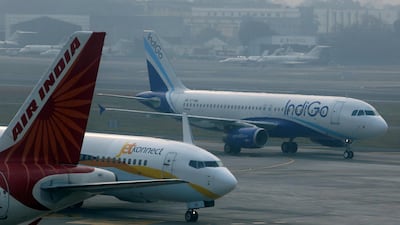India took the drastic measure of grounding all Airbus narrow-body planes powered by the latest Pratt & Whitney engines, removing the aircraft from the country’s skies after a series of in-flight incidents.
A320neos with even one Pratt engine featuring a seal found to cause vibrations are no longer allowed to fly, India’s Directorate General of Civil Aviation said in a statement Monday. The unilateral action is at odds with the European Aviation Safety Agency, the primary regulator for Airbus planes, which repeated guidance that the jets are safe if they have a single affected turbine.
The Indian move immediately grounded eight aircraft at IndiGo, the nation’s largest carrier, and three at GoAirlines India. It comes after three in-service shutdowns of aircraft with one PW1100 engine featuring the seal, two of which occurred in the past week, according to the DGCA. Shares of IndiGo fell as much as 3 per cent in Mumbai on Tuesday.
“Pratt and Whitney engine issues will take a while to get resolved,” analysts at Mumbai-based brokerage Edelweiss Financial Services wrote in a research note on Tuesday, recommending selling the stock. “This will hurt IndiGo in the near term and may lose market share to domestic peers.”
The glitch with the so called knife-edge compressor seal is the latest in a series of expensive problems for Pratt in its development of the geared turbofan engine model. The manufacturer, part of United Technologies Corp. had proposed a fix that would see at least one engine featuring an older seal reinstated on planes while it worked on a more permanent solution.
Under the Pratt plan, all defective components would be replaced by early June, requiring some planes to fly with one affected engine for almost three more months. That’s not acceptable, according to the Indian regulator, which said the manufacturer had “no concrete proposal in place at this stage.”
United Technologies shares fell 1.9 per cent on Monday in New York, while Airbus fell 2.5 per cent in Paris, the biggest loss in a week for both.
Pratt & Whitney said in an emailed statement that it’s working closely with customers to minimize disruption and has already begun to deliver engines with the “upgraded configuration.”
_______________
Read more:
In-flight engine shutdowns halt Airbus deliveries
Airbus' new sales chief says A330neo sales growth vital
Airbus hammers Pratt & Whitney as profits fall well short
_______________
The US company added that the “aircraft on ground situation” may take until the end of the second quarter to address. Of the 11 newly grounded Indian aircraft, as many as five may be able to recommence flying by swapping engines between affected planes.
EASA repeated a ruling that operations by aircraft with one defective engine should be permitted, provided such jets don’t undertake extended flights over water, where they’re more distant from diversionary airports in the event of an emergency.
The Indian decision was a “unilateral” one with which EASA wasn’t involved, the European agency said in an emailed statement, adding that a complete grounding “is not deemed necessary for the time being.”
The snags with the engines have led to repeated grounding of airplanes in India. IndiGo had taken at least seven of its jets out of action by July last year, awaiting a fix for the engines. As recently as February, the DGCA had ordered IndiGo to not fly three of its jets.
Pratt replaced the original seal because it was degrading faster than expected, reducing the planned service interval. Indigo is both the largest current operator of the A320neo and the No. 1 customer. It and GoAir said they’d complied with the DGCA directive.
State-run Air India and Vistara, the local affiliate of Singapore Airlines, also fly the A320neo, but those are powered by CFM engines, made by a joint venture between General Electric and France’s Safran Aircraft Engines.

